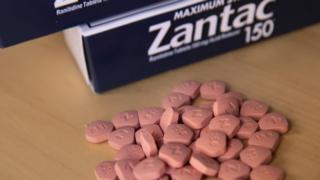Prescribed Zantac heartburn medicine recall in UK
Doctors are being told stop prescribing four types of Zantac, also known as ranitidine, as a “precaution”. …

 Image copyright Getty Images
Image copyright Getty Images UK doctors are being told to stop prescribing four types of a heartburn medication called Zantac or ranitidine as a “precautionary measure”.
It follows concern in several countries that products may contain an impurity that has been linked to cancer.
The four being recalled are Zantac 150mg/10ml Syrup, Zantac 50mg/2ml Injection, Zantac 150mg Tablets and Zantac 300mg Tablets.
But patients should keep taking their prescribed medicine, officials advise.
The Medicines and Healthcare products Regulatory Agency (MHRA) says the health risk of discontinuing the medicine is higher than the potential risk presented by the contaminant N-nitrosodimethylamine (NDMA).
Anyone who is concerned about taking their medication should speak to their doctor or pharmacist.
What is the recall about?
NDMA is classified as a probable human carcinogen (a substance that could cause cancer) on the basis of animal studies. It is present in some foods and in water supplies but is not expected to cause harm when ingested in very low levels.
The MHRA has asked manufacturers to quarantine all products which may contain the active pharmaceutical ingredient that is potentially affected by this issue.
The four in the recall are made by GlaxoSmithKline.
Over-the-counter products (Zantac 75 Relief (PL 02855/0081 [GSL]) and Zantac 75 Tablets (PL 02855/0082 [P]), which people can buy in pharmacies without a prescription, are produced by a different company and are not affected by the recall.
The MHRA is investigating other ranitidine medicines which may also be affected and will provide updates soon.
Should I be concerned?
Currently, there is no evidence that medicines containing this type of impurity have caused any harm to patients, say experts.
Dr Andrew Gray, from the MHRA, said: “Whilst this action is precautionary, the MHRA takes patient safety very seriously.
“We have asked companies to quarantine batches of potentially affected medicines whilst we investigate and we will take action as necessary, including product recalls where appropriate.
“We have also requested risk assessments from the relevant companies which will include the testing of potentially affected batches.”

